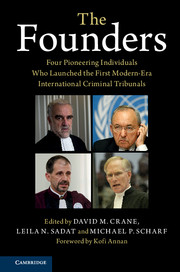 The Founders
The Founders 8 - Closing Perspectives
from PART III - THE TAKEAWAYS
Published online by Cambridge University Press: 23 March 2018
Summary
I have known well each of the prosecutors who wrote the chapters of this book. Some entered my professional life in the early 1990s. Others arrived many years later, after I had left government service for academia. Having negotiated the creation of each of the war crimes tribunals of The Founders, other than the one Robert Jackson steered, I have long been deeply invested in what these men toiled to accomplish during their tours of duty on the front lines of international criminal justice. Of course, it is notable that no women were among the founders, a fact my former boss, Dr. Madeleine Albright (former US permanent representative to the United Nations and former US secretary of state), recognized in the selection of Louise Arbour and Carla del Ponte as Richard Goldstone's successors for the International Criminal Tribunals for the former Yugoslav (ICTY) and Rwanda (ICTR). In later years, women served as the chief prosecutors of the International Criminal Court (ICC) and the Special Court for Sierra Leone (SCSL), and its successor the Residual Special Court for Sierra Leone. But in the beginning, for each tribunal, it was a male-led venture strongly supported by women in the prosecutorial ranks who skillfully helped guide a multitude of trials to their conclusion.
The stories related in this book shape the historical significance of how the improbable war against impunity for atrocity crimes (genocide, crimes against humanity, and war crimes) actually was waged in its earliest years. There were no advance scripts written for this endeavor. Robert Jackson, Richard Goldstone, Luis Moreno Ocampo, David Crane, and Robert Petit wrote their own strategies for the prosecution of war criminals who needed to be investigated, indicted, captured, tried, and either acquitted or convicted if history were to treat the founding prosecutors kindly. Each man confronted seemingly insurmountable challenges of law, bureaucracy, politics, finances, geography, or indicted fugitives evading capture. They have the right to complain about such obstacles; their frustrations fertilize these pages. It is an imperfect world, and they stepped into some of the greatest imperfections. But they had the courage to surmount these initial barricades to justice and bring the perpetrators of evil on Earth to a reckoning they never imagined.
- Type
- Chapter
- Information
- The FoundersFour Pioneering Individuals Who Launched the First Modern-Era International Criminal Tribunals, pp. 147 - 159Publisher: Cambridge University PressPrint publication year: 2018


